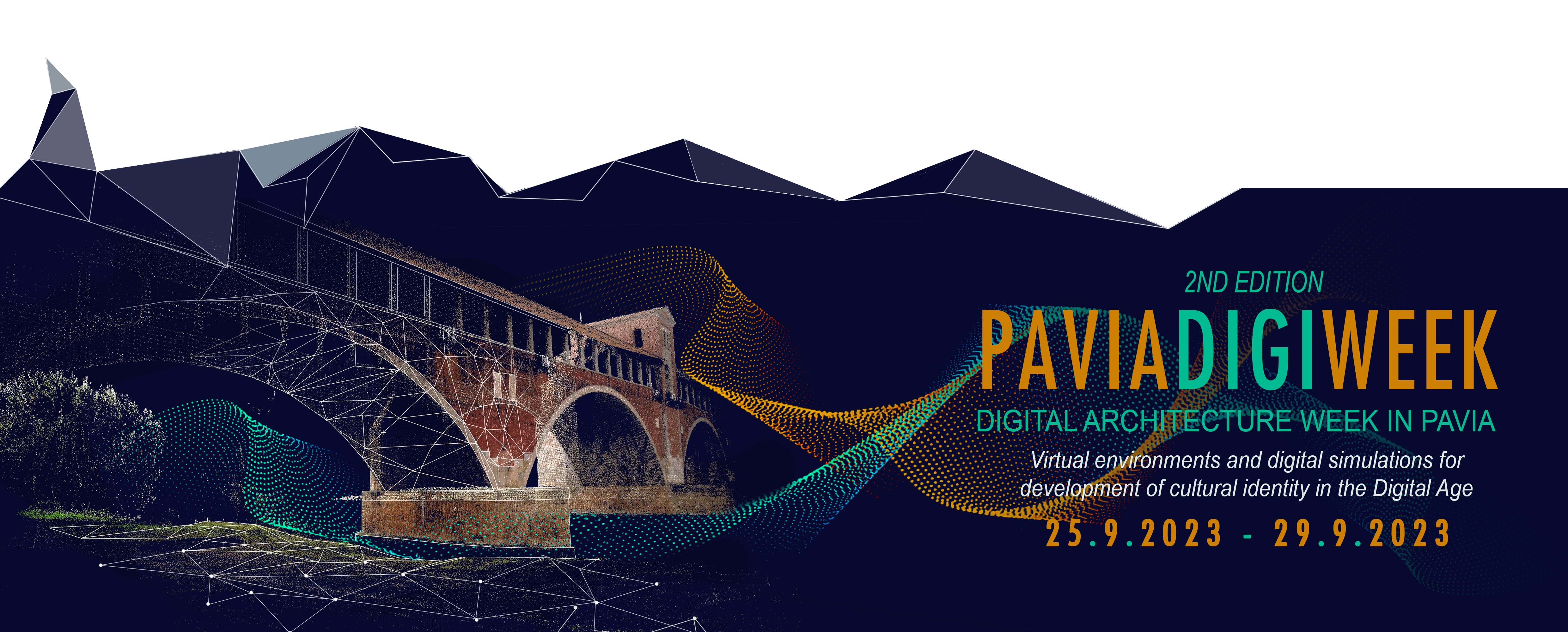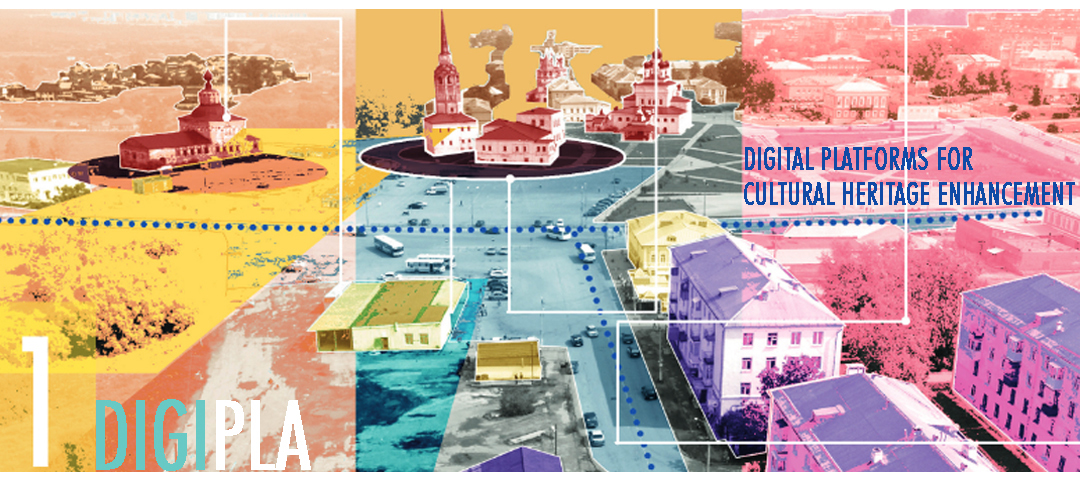PaviaDigiWeek
PaviaDigiWeek aims to offer an advanced educational experience on the opportunities of applying Digital Skills in the field of Architecture and Engineering, triggering interdisciplinary experiences on the implementation of Digital Content and Virtual Reality for Cultural Heritage management. The workshop, organised by the Department of Civil Engineering and Architecture of the University of Pavia, includes an extensive programme of lectures, events, exhibitions, and social meetings, aimed at bringing the public closer to the dimension of Digital Practices and their advanced potential, in the opening and sharing of cultural and creative content related to the Digital Twins and Digital Humanities for Cultural Heritage.
PaviaDigiWeek now in its second edition, is organised in presence at campuses, university colleges and cultural venues in the city of Pavia from September 25th to 29th, 2023. The programme includes appointments among researchers, students, and citizens, and it is aimed at the dissemination of knowledge on Digital Management and Virtual Representation for Architecture and Cultural Heritage products.
International conferences on Education in Digital Era, European Project focuses on Digital for CH, and developable connections at the scale of Cultural Heritage Routes will define the cultural structure of the workshop, with the participation of national and international speakers, and keynotes from H2020 MSCA case studies in research of excellence. The program will be complemented by international seminars, promoted inside the ERASMUS+ Blendeed Intensive Programme, on the sharing of digital practices and the development of virtual products related to the 3D modelling, architectural management and virtual design. During the week, meetings between students, enterprises and researchers from some H2020 European projects and experts in digital strategies for ch documentation will alternate with exhibitions, interviews, publication presentations, musical performances, and social meeting events.
REGISTRATION FORM*
(registrazion closed)
*The Digiweek workshops and activities grant educational credits for the degree course in Construction Engineering and Architecture at the University of Pavia.
For more info about programme and lectures, please contact dadalab@unipv.it
Second Edition Seminars
INTERNATIONAL SUMMERSCHOOL
“VERY-M”
VALUING CHALLENGES ON ARCHITECTURAL TYPOLOGIES
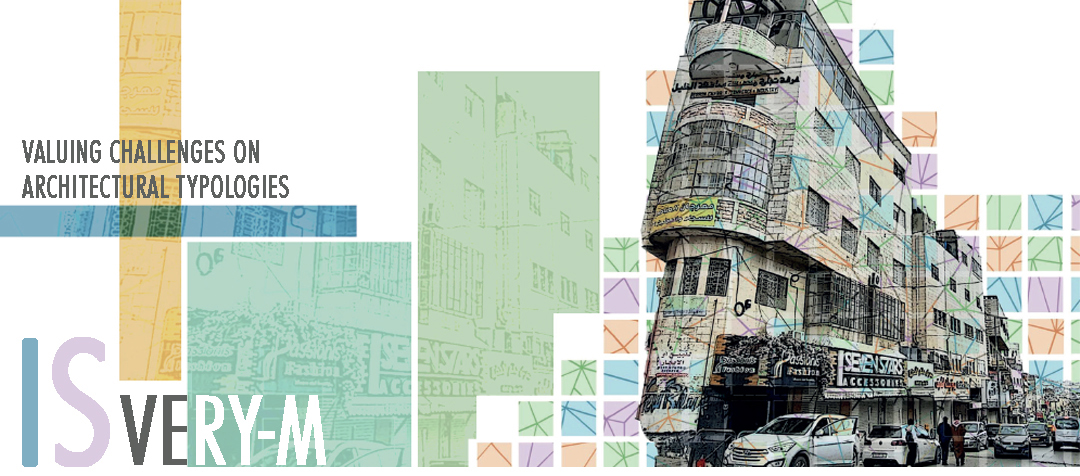
The School aim is to address the recognition and communication of architectural heritage by exploring the ways in which modernity has been translated/adapted in the architectural context, and how to digitally communicate it. Insights and comparisons will be developed between international Mediterranean examples (Italy, Malta, Portugal, North Africa, Turkey, Palestine), searching for common design patterns and conservation lines. Also, it will provide a comprehensive understanding of local architectural heritage and how it has evolved in response to social, cultural and economic changes of traditional values and memories.
The School adopts a joint approach of didactic research, digital communication, international collaboration, and protection design on cataloguing and analysis of Mediterranean modern heritage, outstanding architectural rights and values. Re- ferences to international state-of-the-art (as DOCOMOMO) will be presented in a perspective of empowerment, fitting strategies of communication/dissemination of architectural narratives through Web 4.0 digital tools (3D models, VR envi- ronments, immersive archives), to enhance interdisciplinary social values related to the storytelling of modern heritage. The school will introduce a VERY Digital Dashboard to exchange survey results and critical analysis on architectures, to foster interest/responsibility towards their technological application, conservation and promotion. International partners will strengthen the debate on the adoption/adaptation of architectural features across the West and East Mediterranean.
For more info, visit Moebhios Official Webpage
DIGIPLA
DIGITAL PLATFORMS FOR CULTURAL HERITAGE ENHANCEMENT
DIGIPLA (Digital platforms for Cultural Heritage enhancement) aims to offer an advanced educational experience on the opportunities of applying and improve Digital Skills in the field of Architecture and Engineering, triggering interdisciplinary experiences on the implementation of Digital contents and Virtual products for CH management. Lectures and practical activities will focus on: – the importance of a documentation project for the CH enhancement; –analysis of data acquisition and management methods using fast survey technologies; – development of easily manageable 3D printed and virtual models; – placement of the 3D models on information platforms (Web GIS) to make them viewable and usable for heritage enhancement. The course will consist of an in-presence week (last week of September). Students will work in small heterogeneous groups (constituted by students from different universities, and therefore with different experiences and skills). Each group will work on the topic of developing informative 3D models on Cultural Heritage.
Each group will be provided with databases and information on some European contexts. The individual groups of students will analyse and process the data in order to elaborate the 3D models – digital and printed – and the related information (cards) thanks to the constant support of the teaching and technical staff in attendance.
3DVIEW
3D VIRTUAL ARCHIVE FOR HISTORICAL
ARCHITECTURAL HERITAGE KNOWLEDGE
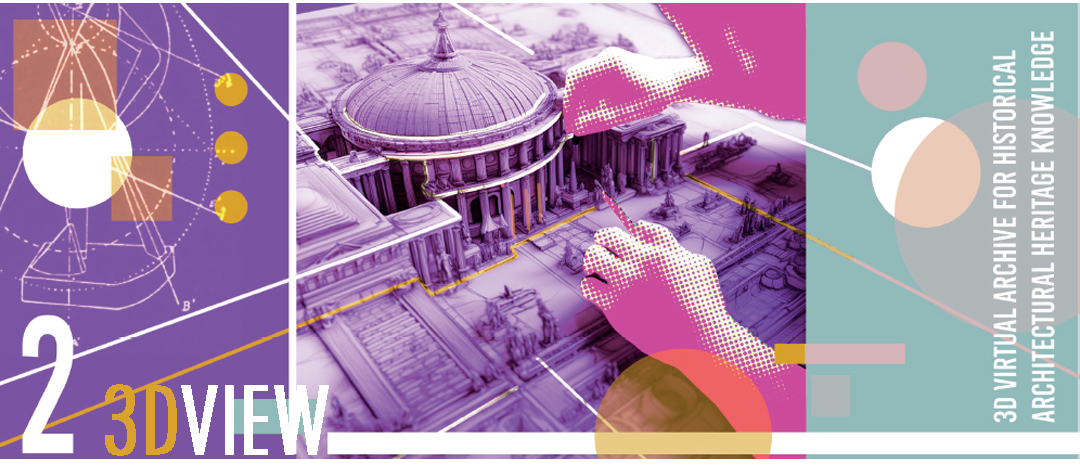 3DVIEW aims to offer an educational experience based on the deepening, knowledge, and promotion of architectural and historical Heritage through the development, integration, and consolidation of specific Digital and Practical Skills, useful for students who intend to learn more about the digitization and virtualization of Cultural Heritage. The project brings together multidisciplinary skills, from architectural history, drawing, and 3D modeling, to build an informative system of online digital collection and fruition of Virtual Reconstructions of valuable architecture.
3DVIEW aims to offer an educational experience based on the deepening, knowledge, and promotion of architectural and historical Heritage through the development, integration, and consolidation of specific Digital and Practical Skills, useful for students who intend to learn more about the digitization and virtualization of Cultural Heritage. The project brings together multidisciplinary skills, from architectural history, drawing, and 3D modeling, to build an informative system of online digital collection and fruition of Virtual Reconstructions of valuable architecture.
The theoretical lectures and work activities will cover: the cultural and methodological aspects of historical, iconographic, bibliographic and archival research; the development of a knowledge base of historical architecture through the structuring of updatable and integrable information sheets; photogrammetric techniques for digitization for archival drawings; the methods of virtual reconstruction through three-dimensional modeling actions, aimed at the digital representation of the Architectural Heritage; the use and development of interactive applications and online platforms, for the remote enjoyment of heritage.
Students will be appropriately organized into multidisciplinary working groups, which will be provided with digitized and vectorized historical archival drawings related to valuable architecture. From the drawings, each student, according to his/her academic background, will collaborate within the group to produce a digital three dimensional representation that can be used online. Specifically, each group will use the most up-to-date methods and software for the digital representation of architecture and will work on: building a 3D model, compiling census information sheets, uploading data to a web platform, and integrating all the information acquired. At the end of the workshop, each group will produce a 3D architectural model integrated with historical, stylistic and artistic information that can be clicked and queried. The models will then be placed on a fruition platform, going to constitute an online digital archive for heritage knowledge and enhancement.
ONEIRIC MAPPING
ON-SITE EVALUATION INSPECTION
AND READABILITY ITINERARY FOR COGNITIVE MAPPING
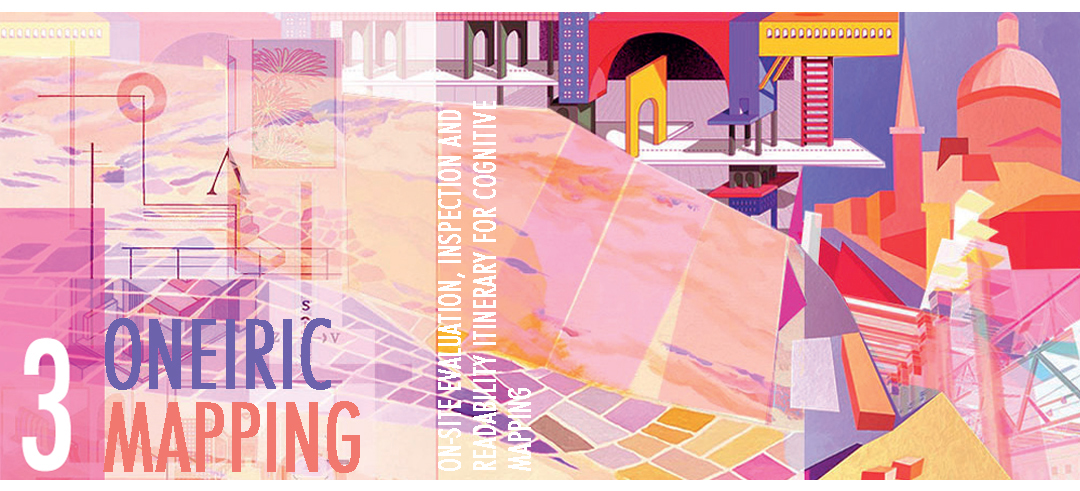 ONEIRIC MAPPING_ON-site Evaluation, Inspection and Readability Itinerary for Cognitive Mapping , aims to activate a replicable project focuses on ways of documenting the urban areas. The goal is to create a digital image of the city by drafting and interactive cognitive maps based on the skills and experiences of the universities involved.
ONEIRIC MAPPING_ON-site Evaluation, Inspection and Readability Itinerary for Cognitive Mapping , aims to activate a replicable project focuses on ways of documenting the urban areas. The goal is to create a digital image of the city by drafting and interactive cognitive maps based on the skills and experiences of the universities involved.
The program will be focused in the challenging production of digital information and interactive maps for documentation and valorisation of the territory. By the end of the in-presence week, the students, divided into working groups, will be able to recreate an image of a portion of a city using innovative digital representations.
The workshop will be divided into frontal lectures (in presence and online) to guide the students in analysing and studying the techniques of perception, representation and fast digital survey for the interpretation and description of the territory, as well as practical laboratory activities (software, digital survey instruments).
The strength of the didactic experience is to develop team-building skills and deepening expertise regarding methodologies for documenting and digitally describing urban areas to understand and interpreting the identity and changes of a territory. Activities will focus on: importance of a digital documentation project for the maintenance of an urban area; analysis of data acquired with digital survey and data management protocols, using digital fast survey technologies; development of conceptual maps capable of synthesising the perceived values and criticalities of the city; tools for virtually visiting the city implementable with layers of informative contents for the built and urban heritage enhancement, valorisation, and dissemination.
Conferences&Meetings
“Visualising and Defending Values in Architectural Changes”
1st International Lectures Cycle Day
7.09.2023
As part of the programme of activities of the Intensive International Summer School “VERY-M”, a scientific-didactic project co-funded by the Erasmus+ BIP Blended Intensive Programme, which will be held in Pavia from 22 to 28 September, it is a pleasure to share the organisation of the next event, the 1st International Conference Cycle Day “Visualising and Defending Values in Architectural Change”, which will be held virtually on 7 September 2023, starting at 9:00 a.m.
The cycle of lectures intends to address issues on the cultural, social, economic, and archaeological values associated with Architectural Heritage, in particular highlighting the application of digital technologies, from documentation to 3D representation, and the opportunities for dissemination and interaction through narrative digital environments. The study theme defines a dynamic framework for in-depth studies and reflections on Cultural Heritage, where history and community contribute to writing a changing vision between memory and actuality. In this way, the value and significance of Architectural Heritage can be consciously directed towards its understanding, sharing and protection by the civil society.
The first event, organised and moderated by Dr. Raffaella De Marco (University of Pavia, Italy) and Dr. Prof. Yara Saifi (Al-Quds University, Palestine), is structured on 3 panels: “History”, “Identity”, “Memory”, and it features international professors and researchers from Italy, Spain, United Kingdom, Turkey, Ukraine and Romania. Among the topics presented, European research and international funding projects for the preservation of World Heritage and emergency sites.
The event will be accessible at the Zoom link: https://us02web.zoom.us/j/
The cycle of international presentations is organised within the MSCA European project “MOEBHIOS – Multi-attribute values’ OntologiEs to improve Built Heritage InformatiOn assessment in cluStered territories”, developed by the University of Pavia (Italy), Al-Quds University (Palestine) and European University Viadrina (Germany).

